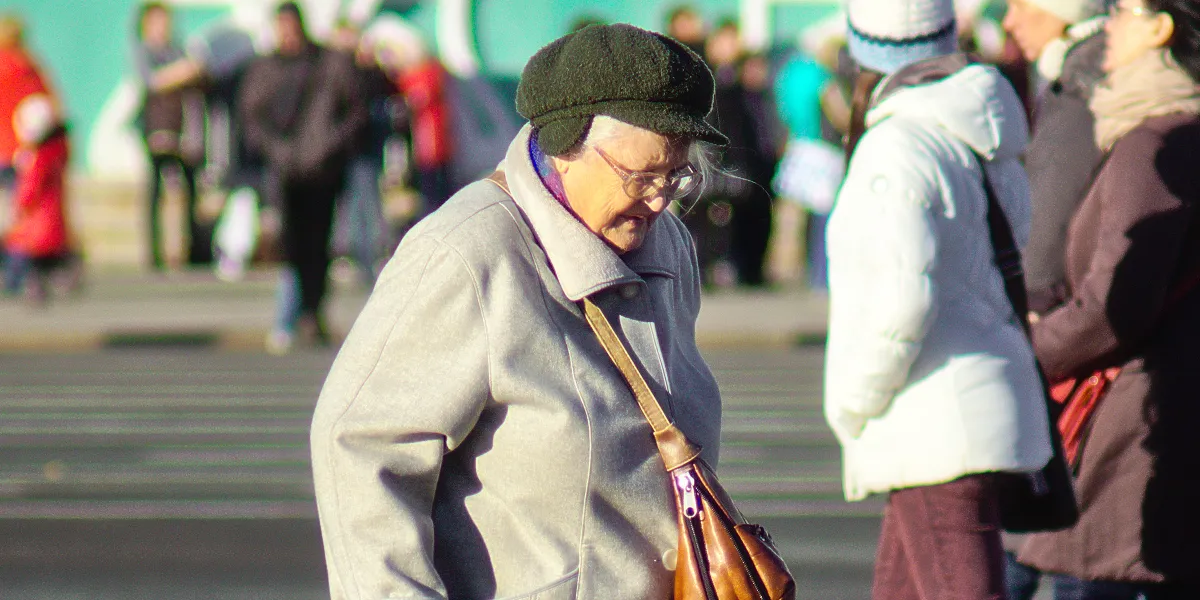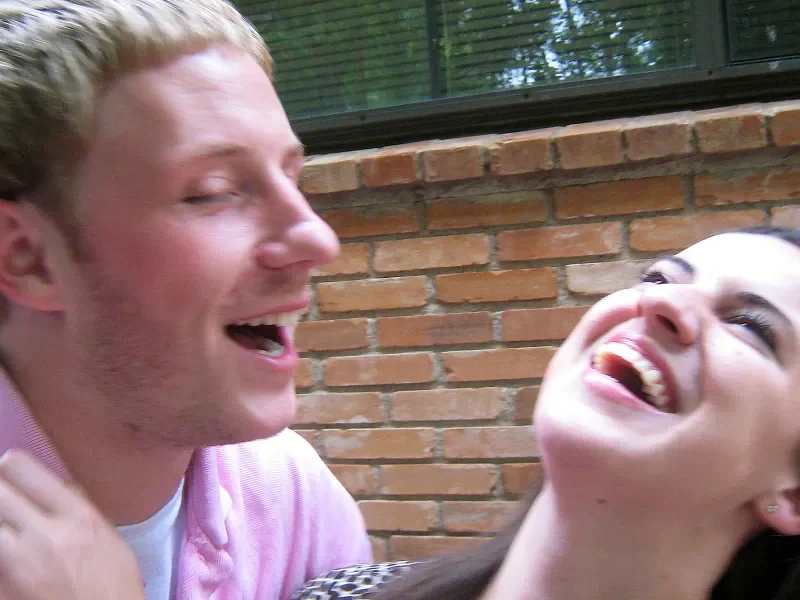When Rachel throws her grandmother out of her luxury wedding over a simple, odd gift, she thinks she’s just preserving her image. But grief has a way of unraveling the truth, and what she finds inside a dusty bag of walnuts will break her open in ways she never expected.
I grew up more in Grandma Jen’s house than I did in my own. My parents, Miranda and John, were always working, trading time for money, and money for status. Meanwhile, Grandma’s old cottage sat at the edge of town, with its creaky porch, lavender-scented doilies, and floorboards that groaned under every step.
To me, it felt like safety.
Grandma Jen used to braid my hair before school, humming softly as her fingers worked through the tangles. The braids were always a little loose, never perfect, but somehow they felt like a crown when she was done.
I’d sit on the floor by her rocking chair while she sipped her tea and read the paper aloud to me. She’d never read the tragic or danger-filled stories, only the funny ones. Her laughter always came before the punchline, a bubbling sound that made me laugh too, even if I didn’t understand the joke.
Every evening, she’d cook the same dinners. Nothing fancy, but always nourishing and comforting, like soft potatoes with black pepper, crisp green beans with butter, and scrambled eggs and sausages that tasted better than anything from a restaurant. She didn’t follow any recipes; she just knew what felt right.
“These are the meals that stick to your bones, my Rachel,” she’d say, setting down the plates.
And every night, just before bedtime, she’d sit beside me on the couch with a tiny bowl of walnuts. They were already cracked and cleaned, and placed in little halves. She always made sure I didn’t have to do the work.
“Eat these, sweetheart,” she’d say, placing them gently in my hands. “They’ll make your heart stronger.”
One night, I remember looking at her with my head tilted, trying to make sense of her words.
“Stronger how, Gran?” I asked.
“In all the ways that matter, sweet girl,” she said, touching her chest over her heart. “In the ways that they can’t see on a scan.”
I had been born with a congenital heart defect. By the time I turned seven, I’d had multiple surgeries. There were years where hospital rooms were more familiar than my own pink and white bedroom. My chest held a thick, pale scar that made me tug my shirts higher than the other girls did.
But Grandma Jen never looked at me like I was breakable. She made me feel whole.
Back then, she was everything to me, my safety net, my warmth. Grandma Jen was the only constant in my life.
But things changed.
As I got older, life started to move faster, or maybe I just stopped noticing the slower moments. My parents, always chasing more, started pouring wealth onto me like it was a reward. Suddenly, my life was all about designer dresses, ski trips, private school tuition, and summers in Italy.
And just like that, I stopped craving the simple meals and quiet nights. I started forgetting the scent of lavender and the sound of Grandma Jen humming.
And somehow, I convinced myself that all I was doing was growing up.
And slowly, Grandma’s house started to feel old to me. It was as if the colors had dulled, though I knew deep down it was me who had changed, not the house.
Whenever I thought of it, I’d think of it as being stale and dusty. The charm I used to adore became something I rolled my eyes at. I stopped visiting as often, and when I did, I’d sit with one foot half out the door, scrolling my phone and checking the time.
Once, I walked in and wrinkled my nose before I even said hello. I wasn’t proud of myself, but somehow, that’s how I’d turned out.
“It smells like old people in here,” I muttered, tossing my coat over the back of her chair.
Grandma Jen looked up from her crossword puzzle and smiled softly.
“That’s the smell of the lavender, honey,” she said. “You used to love it, Rachel.”
I wince thinking about that now. But I didn’t answer her. I just opened a window.
Still, she called every week without fail. Sometimes I answered half-heartedly, earbuds still in, scrolling while she spoke, but she never seemed to mind my distracted replies.
It was always the same warm tone, always asking if I was eating well, sleeping enough, and remembering to take my heart medication.
And every call ended with the same gentle phrase.
“Be kind, sweetheart,” she’d say. “The world’s already too cruel.”
I never said it back. I didn’t even tell her that I loved her or missed her. I just told her I was busy.
When I was 22, I got engaged to Grant. He came from old money and dressed like it. His parents owned a string of restaurants and a vineyard in Napa. He drove a silver Audi, wore cufflinks at breakfast, and had a watch that probably cost more than Grandma Jen’s entire house.
The wedding became a huge event, of course. We invited 500 guests to a waterfront venue. I had three gorgeous gowns, a celebrity chef menu, and a custom floral arch taller than the bridal party.
Everyone there had a title, a brand, or a business card to die for. Grandma Jen wasn’t on the list.
“She raised you,” my mother said, her eyes full of tears. “Please, Rachel. Just invite her. For me, darling.”
“She doesn’t know anyone, Mom. Other than you, Dad, and the few family members that made the cut, Gran won’t know anyone. She’ll feel out of place,” I said, sighing deeply.
“She’ll come for you, Rachel,” my mother said firmly. “She’ll see you looking radiant and happy, and that’s all she’s ever wanted for you.”
So I added my grandmother’s name to the list, reluctantly.
On the day of the wedding, guests shimmered in gowns and tuxedos. Grant looked like he’d just stepped off a runway. A string quartet played by the fountain. Everything looked luxurious and rich.
Then Grandma Jen arrived. For a moment, she looked like she had stepped out of another world entirely.
She walked slowly, wearing her old blue dress pressed neatly but visibly worn. Her hair was pinned back in a simple clip, her shoes didn’t match, and in her hands, she clutched a faded cloth bag with frayed corners and a stain near the zipper.
I thought I’d get away without having to greet her, but then her eyes found mine.
“My Rachel,” she said softly, smiling. “I brought you something. Please open it soon, okay? It’s my gift. There’s a surprise inside, darling.”
She pressed the bag into my hands. I peeked inside.
Walnuts. Dry, cracked, and dusty walnuts.
My cheeks flushed with heat.
“Are you serious right now?” I asked, my voice low but sharp. “You brought me a bag of dirty walnuts. To my wedding?”
“They’re special,” she said, blinking slowly, like she was holding back tears.
But I couldn’t stop the words from tumbling out.
“It’s a dirty bag, Grandma. This is embarrassing!”
I looked away, and for the first time in my life, so did she.
My voice cracked. I don’t know if it was wedding nerves, shame, or the sting of knowing I’d just crossed a line I couldn’t uncross. Around us, the music kept playing, soft and elegant, but I felt it slower, like time itself was hesitating.
I could feel the stares, the discomfort rippling through the reception tent like static.
“Babe,” Grant said, falling into step beside me. “It’s okay, just take the gift.”
But I shook my head.
“You can’t just show up with… trash, Grant,” I said, my voice low and sharp. “Not after saying how much I mean to you… Come on, Gran… Even you know this wasn’t okay.”
My grandmother didn’t even look at me.
“Just go,” I said quietly.
Grandma Jen didn’t argue. She stood there for a second, steadying herself against the edge of the table. Her eyes didn’t meet mine. She gave a small nod, barely visible, then turned and walked away slowly, her steps careful and silent, like she didn’t want to make a sound.
No one stopped her. No one said a word. It was like the air itself had folded in, carrying her absence even before she left the room.
My mother put a hand to her mouth, her tears already falling. I saw her start to move, but I looked away.
I didn’t care. Or at least, I told myself I didn’t.
Two days later, Grandma Jen called me. Her name lit up my phone, and I stared at it without moving. My chest felt tight, but I let it ring out. I couldn’t face her.
She called again later that evening.
“Grandma, I’m really busy. Can we talk later?” I asked.
“I just wanted to know if you opened my gift, Rachel,” she said.
“Not yet, okay? I’ll get to it eventually. But please, stop calling me about stupid things. I know what walnuts taste like, Gran. Opening them today or tomorrow isn’t going to change that.”
“Of course, sweetheart,” she said after a long pause. “I’m sorry to disturb you.”
She didn’t call again.
Two months later, while I was getting dressed for a photo shoot Grant had arranged, my phone rang, my mother’s name on the screen. I answered on speaker, brushing my hair.
“Mom, I’m busy,” I said. “Can this wait? I’m getting ready for a shoot, and you know how photographers can be if you’re late.”
“Rachel,” my mother said, her voice hollow. “Grandma Jen… she’s gone.”
“What? What do you mean? Gone where?” I asked, sitting down.
“Darling, she’s… her heart gave out.”
At the funeral I stood next to her casket. Her hands were folded like she was still waiting for something. Her nails were painted a pale pink, her favorite color. And the faint scent of lavender clung to everything.
It smelled like home. And I couldn’t stop shaking.
The memories came back all at once—her laugh echoing in the hallway, her quiet humming in the kitchen, the way she used to wipe my face with a warm cloth after I stuffed it full of walnuts and banana bread.
I remembered how she’d always clean my hands with that floral handkerchief she kept in her sleeve or pocket. The scent of that cloth, laundry softener and starch, was the smell of being cared for.
At the funeral, I broke down completely. My legs buckled, and someone caught me before I hit the ground. I cried so hard I could barely breathe.
That night, I got in the car. I should have stayed at my parents’ house. I should have let Grant drive me around. But I needed to move; I needed to do something, anything, to outrun the guilt clawing at my chest. The headlights blurred through my tears.
“I just need to get home,” I kept whispering to myself. “I need the bag. I need to open it. I need to crack open those walnuts.”
But I never made it.
The car swerved. The impact was sharp and sudden. Then everything went dark.
I woke up in the hospital two days later, my ribs aching, gauze wrapped around my legs, with tubes snaking out from both arms. My face felt swollen and hot.
Grant was there. He looked pale and panicked.
I tried to speak, but my throat was raw and dry.
“Rachel?” he said, leaning closer. “You’re awake. Oh, thank God!”
“Please, the walnuts,” I rasped. “Please, Grant. Please.”
“What?” he asked, confused.
“The bag. Grandma Jen,” I whispered. “It’s in the pantry. Please bring it.”
“Okay, I’ll go get it now,” he said, hesitating, as though I’d change my mind.
When he returned, he handed it to me carefully. The cloth was wrinkled. The corner still had that faded stain. I pulled it into my lap, my fingers trembling.
At first, they looked the same. Dry, dull, and ordinary.
I cracked the first one open.
Inside was a tiny folded note, yellowed but carefully tucked.
“Be kind, Rachel. The world can be cruel, but don’t let it change you.”
I cracked another. A $20 bill fluttered into my lap.
“Save, Rachel. Save for your future.”
I couldn’t hold it together. My chest heaved, setting off a monitor. A nurse rushed in, asking if I was in pain, but I just shook my head and cried.
Walnut after walnut—they each held her love. And her savings, her advice, and her voice. Grandma Jen had spent years preparing this gift. She had been thinking of me, believing in me, even when I had looked her in the eye and pushed her away.
I cracked the last walnut. Inside was one final note, the ink slightly smudged.
“We all make mistakes, my sweet girl. You deserve forgiveness. It’s never too late to choose love.”
I pressed it to my chest. My body shook as I spoke.
“I’m sorry, Grandma,” I whispered. “I’m so, so sorry.”
A week later, when I was well enough to leave the hospital, I asked my husband to drive me to the beach. He didn’t ask any questions.
I sat in the sand barefoot, the breeze wrapping around me like a blanket I didn’t deserve. The sun was beginning to set, casting soft pinks across the water.
I pulled out a single walnut from my pocket.
“I wish I could go back,” I said aloud. “I’d hug you tighter. I’d open the bag the moment you handed it to me. I’d tell you that your hands weren’t dirty, but that they were the cleanest and warmest touch I’d ever known.”
The waves answered with hushes and sighs.
I cracked the walnut. There was no note this time, just the nut, simple and whole.
I ate it. Then I cried into the sea.
“Thank you, Grandma Jen,” I said to the water. “Thank you.”
A few days later, I found myself in the kitchen before sunrise. The house was quiet except for the soft hum of the fridge and the occasional creak of the floorboards beneath my bare feet.
Grant sat at the marble counter in his robe, sipping his morning espresso from a glass cup. The sleekness of it all—the stainless-steel appliances, the high-backed bar stools, the imported ceramic plates—suddenly felt cold.
I opened the fridge, pulled out a bag of potatoes, and started peeling.
“You’re up early,” Grant said, his voice low. “You didn’t sleep again?”
“I just… wanted to make something,” I said softly.
He watched as I cut the potatoes into quarters and tossed them into a pan with butter. I didn’t measure anything; I just added salt and black pepper like Grandma Jen used to. The smell hit me in a wave. I closed my eyes for a second.
“What are you making?” he asked, setting his cup down.
“Just something simple,” I said. “She used to make it for me all the time. Buttery potatoes. Scrambled eggs. And sausages if she had them. She always said the simplest meals meant the most if they were made with love.”
Grant came around the counter and leaned against the island. He didn’t touch me, just stood near.
“I didn’t know that about her,” he said gently.
“She was everything to me once,” I said. “I forgot. Or maybe I chose to forget.”
“I was shocked, Rach. What you said to her… it wasn’t you. Not really. It wasn’t the woman I fell in love with.”
I turned from the stove, blinking back tears.
“But it was me. That version of me—the one who cared more about appearances than people. I let that version of me grow for too long.”
He stepped closer and took my hand.
“But you’re not that girl anymore. I see you now. The real you. And I love you more,” my husband said.
I set the plate of buttery potatoes and eggs between us. No garnish. No Instagram moment. Just a quiet apology in every bite. And somehow, it felt like she was at the table too, her spirit woven into the steam rising from the food.
And for the first time in months, I let someone love me while I grieved.


